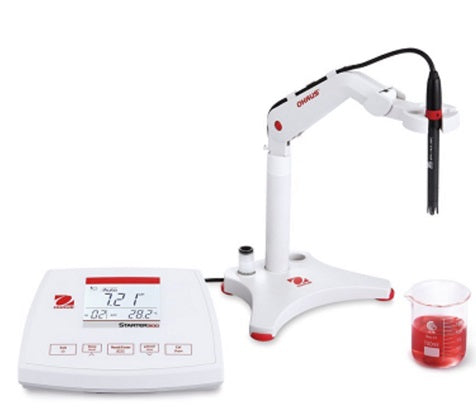The monitoring of pH is vital for many industries and levels of government where quality control and safety are important considerations. Benchtop meters are a particular version of pH meter primarily used within a laboratory environment. They are one of the three main design types of pH meter.
In this article, we unpack the essentials about benchtop pH meters and what benefits they provide. You can also check out some examples of representative and popular models.
What is a benchtop pH meter?
While the name “benchtop pH meter” suggests benchtop usage, many designs can also be mounted on a wall. Generally, when compared to other types of pH meters benchtop meters are more sophisticated and sturdy devices. You can expect greater accuracy, a higher capacity for data storage and more connectivity options. These features make them well-suited to laboratory environments.
What are the key benefits of a benchtop pH meter?
OK let’s take a closer look. Benchtop ph meters differ from alternative versions of ph meters such as pen testers and handheld pH meters. Compared to these, benchtop meters have the following advantages:
- Greater accuracy
- Sturdy and efficient: Sitting on a bench or wall-mounting significantly decreases the risk of meter damage or sample spillage. Most units are constructed with an electrode holder arm. This reduces the risk of electrode damage and simplifies product sampling.
- Greater variety of electrodes: Manufacturers of benchtop pH meters supply a wider variety of compatible electrodes compared to other types of meters.
- More memory: Typically, benchtop pH meters have more data logging and calibration memory. This a big plus if GLP (Good Laboratory Practices) is an important consideration in your selection process.
- Greater connectivity: Some benchtop pH meters provide you with the option to download data onto your computers or to print results. Again, this is perfect for long term data retention and GLP.
- Calibration options: Benchtop meters typically offer more calibration points. The more calibration points a unit has, the greater the accuracy of your device post calibration.
| Instrument Choice Scientist Tip: Always calibrate your meter to a minimum of two points. |
Examples of benchtop pH meters
Instrument Choice scientists have compiled some examples of Benchtop pH meters that demonstrate different types of design, as well as degrees of accuracy, calibration, connectivity and electrode compatibility.
Benchtop pH / MV Meter 
Product Code: IC860031
Rugged and easy to use, the IC860031 is a perfect example of a benchtop meter with an electrode holder in-in-one.
- Accuracy: ±0.02pH
- Electrodes: Accepts any pH or ORP probe with a standard BNC connector.
- Memory: Stores 99 data points
- Connectivity: Connect the device via RS232 to a computer to transfer data. Free software included in the kit.
- Calibration points: 5 Calibration points
Edge Benchtop pH meter kit 
Product Code: IC-HI2002-02
This benchtop ph meter is made for labs where ergonomic design matters. It’s thin, light and has a large display. The Edge Benchtop Meter is also very accurate. These characteristics combine to make it popular with operators. In summary, it’s ideal for laboratory use.
- Accuracy: ± 0.01pH
- Electrodes: Variety of Hanna pH and ORP probes compatible with this meter.
- Memory: Store up to 1000 data points
- Connectivity: USB port to download data to USB or connect straight to a computer.
- Calibration points: 5 calibration points
Starter 3000 pH Bench Meter 
- Accuracy: ±0.01pH
- Electrodes: Ohaus manufactures a wide range of pH and ORP electrodes that are compatible with this meter.
- Memory: 99 data points
- Connectivity: Connect the device via RS232 to either a printer or computer to transfer data.
- Calibration: 3 calibration points
Conclusion
Here are the take-home points for benchtop pH meters. Built for laboratory use, they are:
- High-powered
- Extremely accurate
- Have more data storage; and
- Less likely to give you sample spillage or meter breakage.
Want to browse more examples of benchtop pH meters? Search the Instrument Choice online store. You’ll find an extensive range of the quality, cost-effective units that have been personally selected by our scientists.
Need some help selecting a benchtop pH meter to meet your needs? Contact one of our knowledgeable team of scientists on 1300 737 871 or via email at customer-service@instrumentchoice.com.au. We’ll help find you a pH meter to suit your application and budget!
